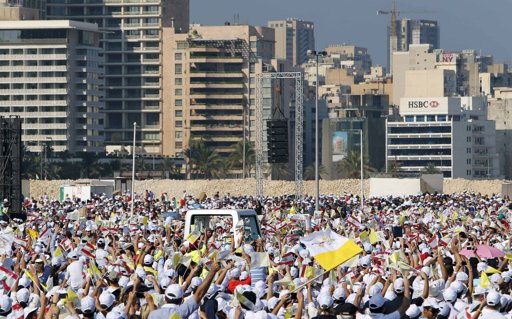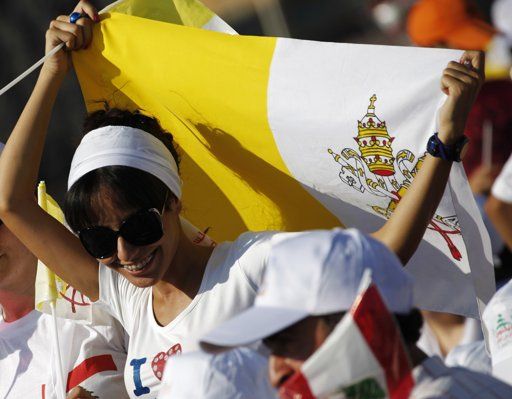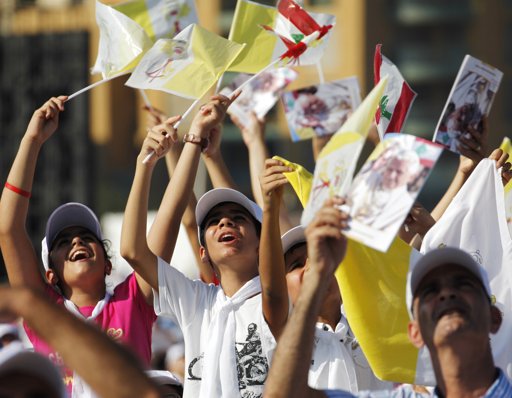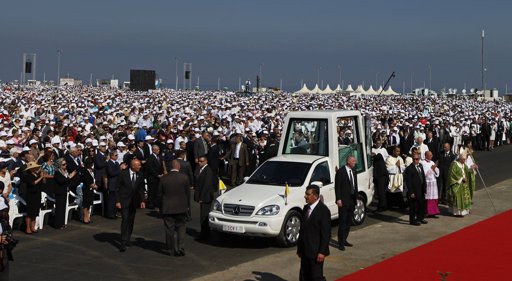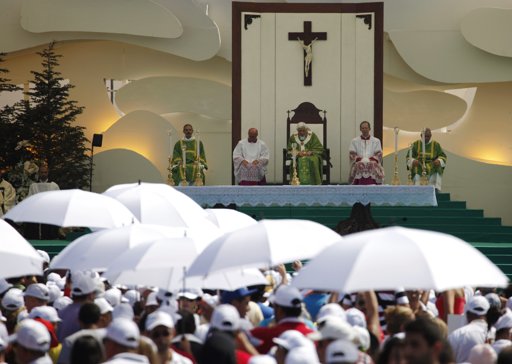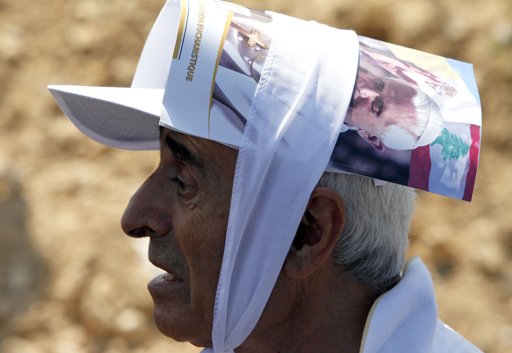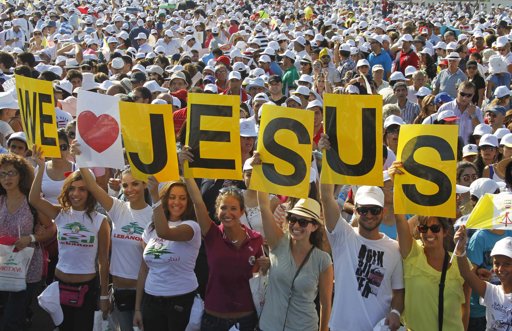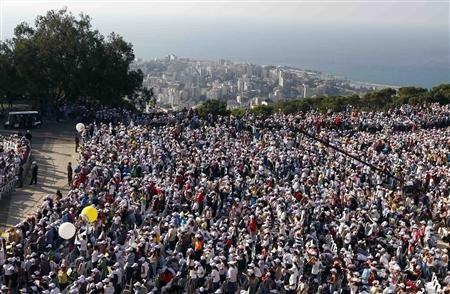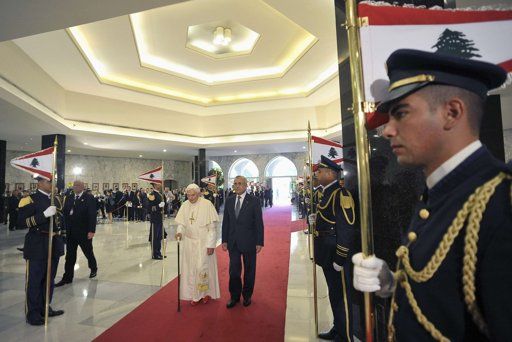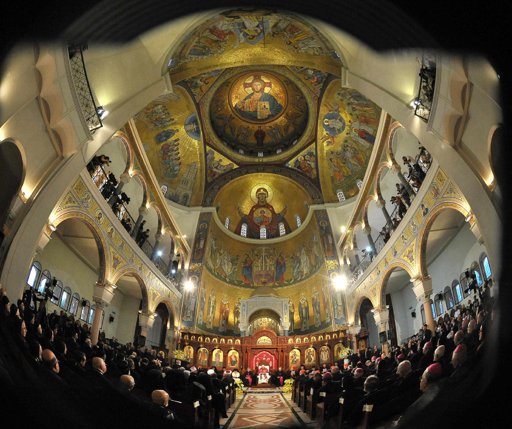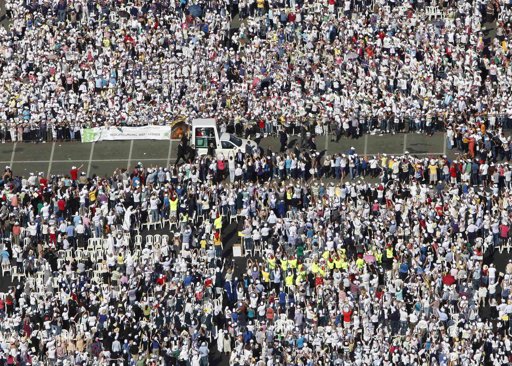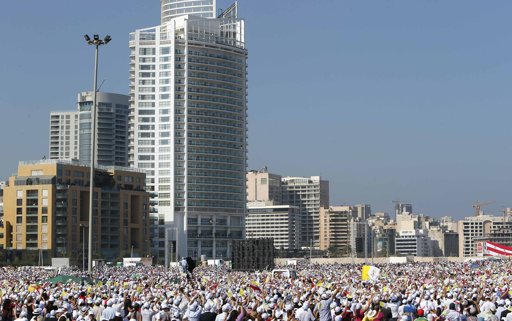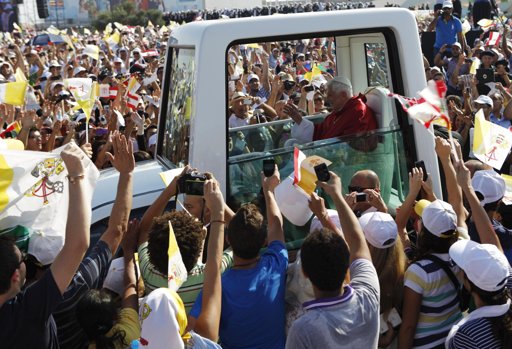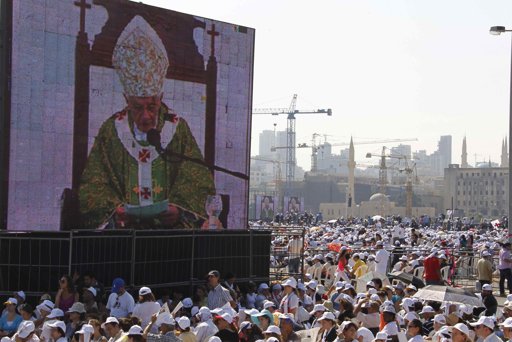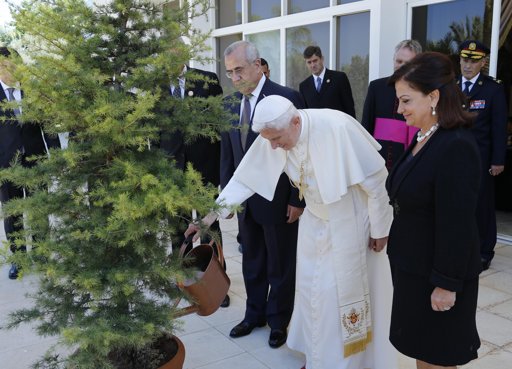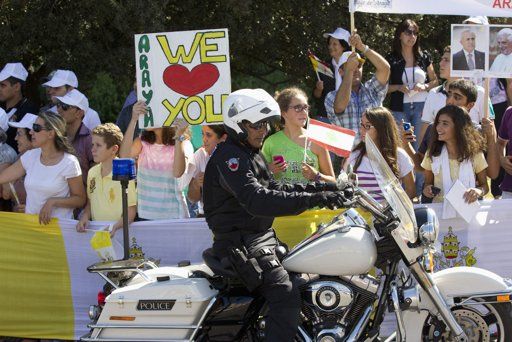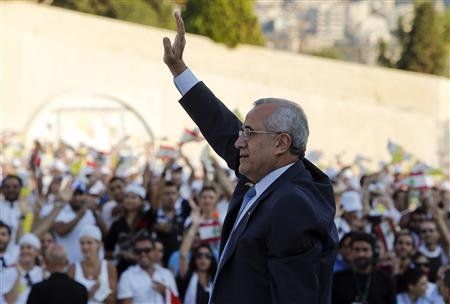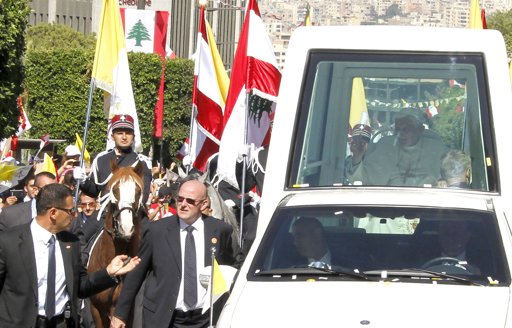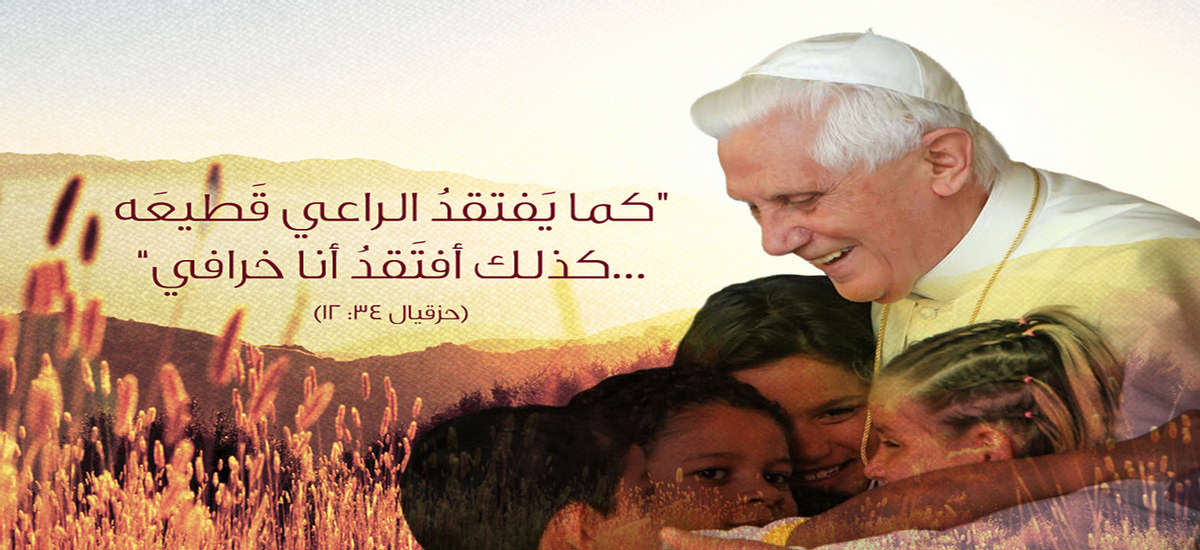
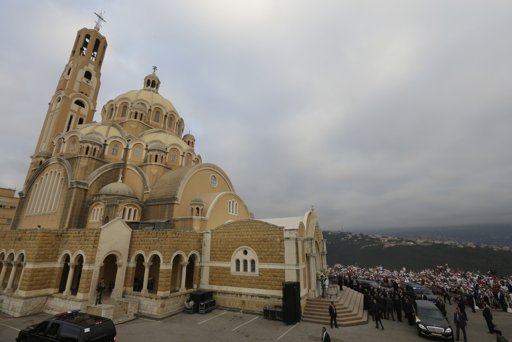
The convoy of Pope Benedict XVI, right, arrives at St. Paul’s Basilica to sign the post-Synodal Apostolic Exhortation of the special assembly for the Middle East of the Synod of Bishops, in Harissa
Pope signs momentous document on Church in the Middle East
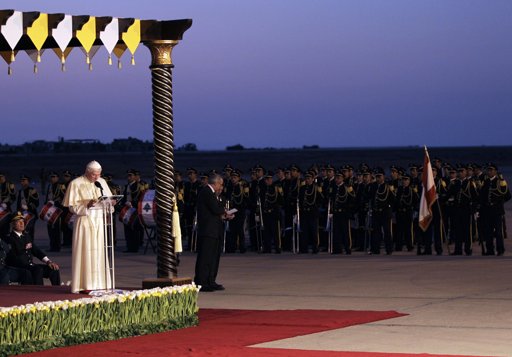
Pope Benedict XVI, left, addresses a speech in front of Lebanese honor guards during his
An aerial view of the waterfront where a mass is being held by Pope Benedict XVI in Beirut
Pope Benedict waves from his Pope-mobile upon his arrival to conduct an open-air mass
The faithful holds a Vatican flag during an open air mass conducted by Pope Benedict
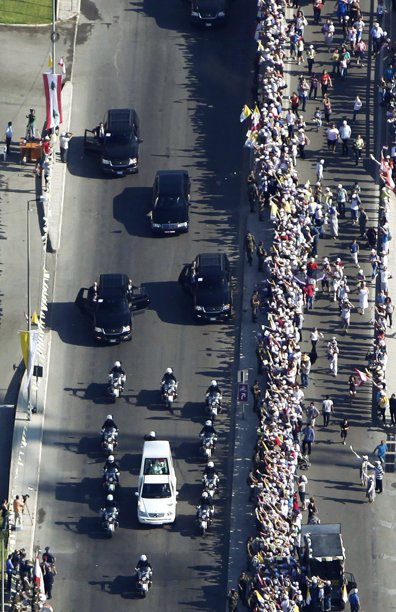
Pope Benedict disembarks from Pope-mobile to conduct an open-air mass service at Beirut
Pope Benedict XVI conducts an open air mass service as faithfuls use umbrella
Faithful gather at Bkerke in Harissa near Beirut before the Pope Benedict XVI meets the youth September 15, 2012. REUTERS/ Stefano Rellandini
Pope Benedict XVI walks next to Lebanon’s President Suleiman as he arrives at Baabda Pres.
Pope Benedict XVI and Gregorios III, Patriarch of the Church of Antioch, attend a ceremon…
Pope Benedict XVI waves to faithfuls from his pope-mobile upon his arrival to conduct an open air mass service at Beirut City Centre Waterfront,
Pope Benedict XVI arrives at the waterfront of Beirut where he will lead a mass
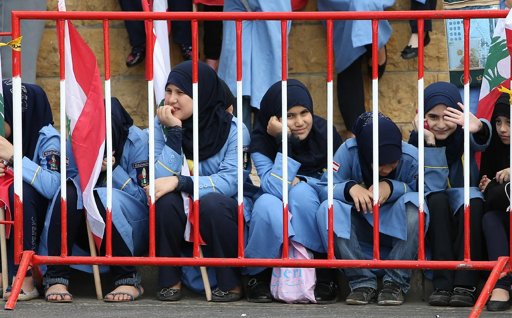
Hezbollah Al-Mahdi girl-scouts wait outside Rafik Hariri international airport to welcome the Pope Benedict XVI, in Beirut
Pope Benedict conducts an open air mass at Beirut City Centre Waterfront
Pope Benedict XVI has signed his Post-Synodal Apostolic Exhortation on the Church in the Middle East, “Ecclesia in Medio Oriente,” during the first day of his visit to Lebanon. “The Exhortation as a whole is meant to help each of the Lord’s disciples to live fully and to pass on faithfully to others what he or she has become by Baptism: a child of light, sharing in God’s own light, a lamp newly lit amid the troubled darkness of this world, so that the light may shine in the darkness,” he said. Pope Benedict made his remarks during the official signing ceremony at the Melkite Greek Catholic Basilica of St. Paul in the coastal town of Harissa, Sept. 14. “The document seeks to help purify the faith from all that disfigures it, from everything that can obscure the splendor of Christ’s light,” he noted. “For communion is true fidelity to Christ, and Christian witness is the radiance of the paschal mystery which gives full meaning to the cross, exalted and glorious.” The exhortation is the Pope’s response to the deliberations of the Synod of Bishops of the Middle East held at the Vatican in October 2010. The topic for discussion then was “The Catholic Church in the Middle East: Communion and Witness.” “Churches of the Middle East, fear not, for the Lord is truly with you, to the close of the age!” urged Pope Benedict, “Fear ot, because the universal Church walks at your side and is humanly and spiritually close to you!”
Pope Benedict XVI waters a Cedar tree as Lebanon’s President Michel Suleiman and his wife Wafaa (R) watch him at Baabda Presidential Palace near Beirut,
Pope Benedict XVI waves as he arrives for a meeting with youths in Bkerke in Harissa,
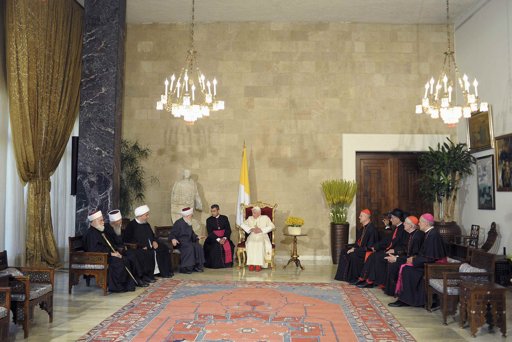
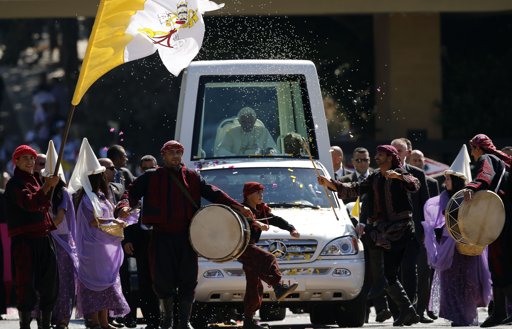
Pope Benedict XVI greets children welcoming his arrival at Baabda Presidential Palace near Beirut, as Lebanon’s President Michel Suleiman and his wife Wafaa (R) watch September 15, 2012. Pope Benedict.
Pope Benedict XVI greets faithful from his Pope Mobile as he is surrounded by bodyguards
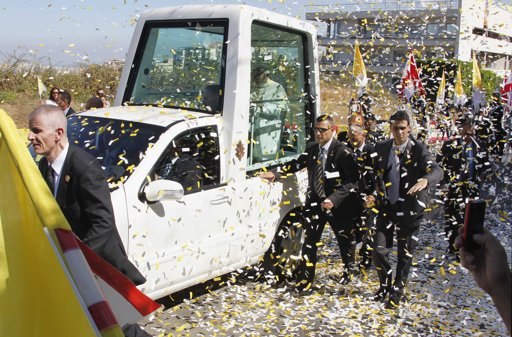

Bodyguards escort the Pope Benedict XVI greeting faithful from his Pope Mobile,
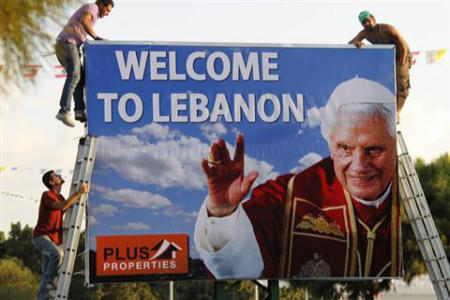
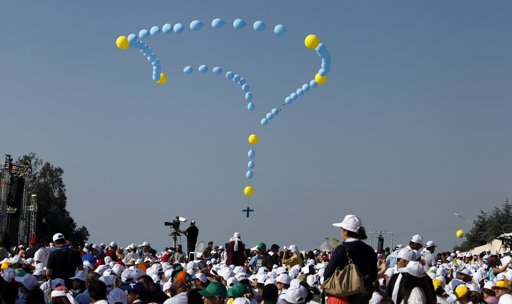
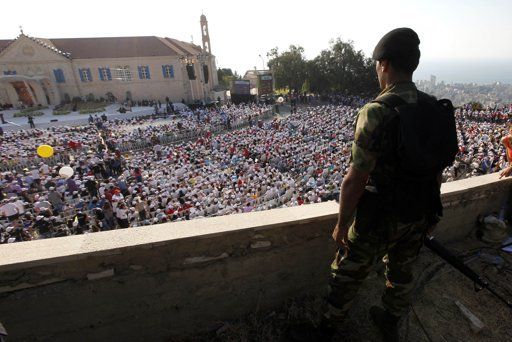
Reuters via Yahoo! News – 1
The Patriarch claimed that the Muslim community was "very enthusiastic about the Pope’s visit" and expressed his belief that "the Pope will help bring the dawn of peace to the region." And that the "real Arab Spring will arrive as the fruit of a Christian Spring and we can help to achieve this through communion and witness to love".
Pope Benedict XVI attends the St. Paul basilic in Beirut

Pope Benedict XVI is welcomed by Lebanon’s President Suleiman upon his arrival at Beirut’..

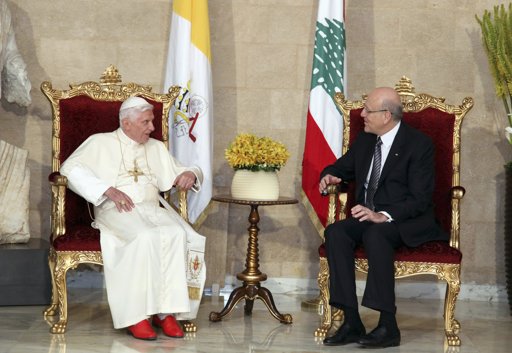
Pope Benedict XVI stands on a podium as he greets Shi’ite Mufti Sheikh Abdel Amir Qabalan.
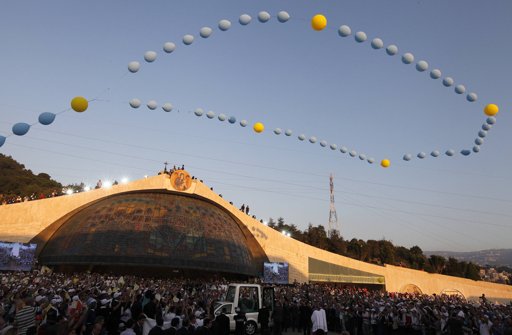
Reuters via Yahoo! News – Sep 14 12:57am
Pope Benedict XVI is presented with an electric car in Castel Gandolfo, in the outskirts
Reuters via Y
Pope encourages ‘culture of peace’ in Lebanon
.- In a speech to Lebanese leaders on Saturday, Pope Benedict XVI called for the strengthening of a “culture of peace” that is built upon respect for life, the family and religious liberty.
It is “quite demanding” to achieve peace, the Pope told a gathering of political, cultural and religious leaders at the Presidential Palace in the city of Baabda, Sept. 15. Peace involves “rejecting revenge, acknowledging one’s faults, accepting apologies without demanding them, and, not least, forgiveness. Only forgiveness, given and received, can lay lasting foundations for reconciliation and universal peace.”
He praised Lebanon as a Middle Eastern country where Christianity and Islam “have lived side by side for centuries.” In Lebanon, he said, it is “not uncommon to see the two religions within the same family.” If it is possible to have harmony within the same family, he asked, “why should it not be possible at the level of the whole of society?”
Pope Benedict had begun the second day of his apostolic visit with a private Mass at the Apostolic Nunciature of Harissa before being taken by car to the Presidential Palace. There he was greeted by the President of Lebanon, General Michel Sleiman. The two men then had a private meeting.
Following further meetings with the President of the Lebanese Parliament, Nabih Berri, and the country’s Prime Minister, Nagib Mikati, the Pope then held discussions with the leaders of Lebanon’s Sunni, Shiite and Alawite Muslim communities, as well as with leaders of the Druze community.
The Pope’s subsequent address to civil society leaders concerned “understanding and harmony between cultures and religions.”
Religious coexistence and peace, he said, require a “profound transformation of mind and heart” at the level of the individual in order to recover both “a degree of clarity of vision and impartiality” and “the profound meaning of the concepts of justice and the common good.”
Without this, the Pope warned, “all our coveted human ‘liberations’ prove disappointing” as they become “curtailed by our human narrowness, harshness, intolerance, favoritism and desire for revenge.”
In order to build this desired “culture of peace,” however, there has to be a constant need to “return to the wellsprings of our humanity.”
“A person comes into this world in a family, which is the first locus of humanization, and above all the first school of peace,” he said, “To build peace, we need to look to the family, supporting it and facilitating its task, and in this way promoting an overall culture of life.”
The effectiveness of our commitment to peace, proposed the Pope, depends on our understanding of human life.
“If we want peace, let us defend life!” he urged.
This approach should lead society to reject not only war and terrorism “but every assault on innocent human life, on men and women as creatures willed by God.”
Wherever this “truth of human nature is ignored or denied”, he cautioned, it becomes impossible to respect the “grammar which is the natural law inscribed in the human heart.”
Securing peace for future generations requires that we “educate for peace in order to build a culture of peace.”
Education in both the family and the school must focus on “those spiritual values which give the wisdom and traditions of each culture their ultimate meaning and power,” the Pope exhorted. “The human spirit has an innate yearning for beauty, goodness and truth.”
The Pope’s call for peace comes amid armed conflict in Lebanon’s neighbor Syria between government and rebel forces. That conflict has at times reflected religious divisions.
Pope signs momentous document on Church in the Middle East
Pope Benedict XVI has signed his Post-Synodal Apostolic Exhortation on the Church in the Middle East, “Ecclesia in Medio Oriente,” during the first day of his visit to Lebanon. “The Exhortation as a whole is meant to help each of the Lord’s disciples to live fully and to pass on faithfully to others what he or she has become by Baptism: a child of light, sharing in God’s own light, a lamp newly lit amid the troubled darkness of this world, so that the light may shine in the darkness,” he said. Pope Benedict made his remarks during the official signing ceremony at the Melkite Greek Catholic Basilica of St. Paul in the coastal town of Harissa, Sept. 14. “The document seeks to help purify the faith from all that disfigures it, from everything that can obscure the splendor of Christ’s light,” he noted. “For communion is true fidelity to Christ, and Christian witness is the radiance of the paschal mystery which gives full meaning to the cross, exalted and glorious.” The exhortation is the Pope’s response to the deliberations of the Synod of Bishops of the Middle East held at the Vatican in October 2010. The topic for discussion then was “The Catholic Church in the Middle East: Communion and Witness.”
The Pope, who is in the country from Sept. 14 -16, noted the providence of signing the document on the Feast of the Exaltation of the Holy Cross, which has its origins in 4th century Jerusalem during the reign of the Roman Emperor Constantine.
He also reminded those present that next month is the 1700th anniversary of the appearance to Constantine of the Chi-Rho, the first two letters of Christ’s name in Greek. It appeared to the emperor as a “radiant in the symbolic night of his unbelief and accompanied by the words: ‘In this sign you will conquer!’” prior to victory at the Battle of the Milvian Bridge near Rome, thus paving the way for the acceptance of Christianity within the Roman Empire.
Reading the exhortation with these historic events in mind “leads to renewed appreciation of the identity of each baptized person and of the Church, and is at the same time a summons to witness in and through communion,” said the Pope.
“For Christians, to exalt the cross means to be united to the totality of God’s unconditional love for mankind. It means making an act of faith!” he said.
“To exalt the cross, against the backdrop of the resurrection, means to desire to experience and to show the totality of this love. It means making an act of love!”
“To exalt the cross means to be a committed herald of fraternal and ecclesial communion, the source of authentic Christian witness. It means making an act of hope!”
Listening to Pope Benedict was a packed congregation consisting of leaders of Lebanon’s 40 percent Christian community – mainly Catholic and Orthodox – along with leaders of other religions including the region’s dominant faith, Islam.
The Pope thanked God that it was the people of the Middle East “were the first to welcome his incarnate Son” but also recognized that following Jesus Christ in the region today often requires much “courage and faith.”
This was why, he said, the Synod Fathers were keen to reflect upon the “joys and struggles, the fears and hopes of Christ’s disciples in these lands.”
“In this way, the entire Church was able to hear the troubled cry and see the desperate faces of many men and women who experience grave human and material difficulties, who live amid powerful tensions in fear and uncertainty.”
Such is the way of the exultation of the cross, said the Pope, that it often requires following Christ “even in difficult and sometimes painful situations.”
“It is here and now that we are called to celebrate the victory of love over hate, forgiveness over revenge, service over domination, humility over pride, and unity over division.”
Middle Eastern Christians, therefore, should not fear the future but, instead, should “stand firm in truth and in purity of faith” that results from the “the cross, exalted and glorious.”
“Churches of the Middle East, fear not, for the Lord is truly with you, to the close of the age!” urged Pope Benedict, “Fear not, because the universal Church walks at your side and is humanly and spiritually close to you!”
Pope Benedict XVI leaves after a ceremony at St. Paul Basilica in Harissa, Lebanon, near Beirut, on the first day of his visit to the Mideast nation. (Alessandra Tarantino, Associated Press / September 14, 2012)
Shortly after his arrival on Friday, September 14, 2012, he will travel to the Melkite Greek Catholic basilica of St. Paul in Harissa where he will sign the Post-Synodal Apostolic Exhortation on the vital Role of the Church in the Middle East. This highly anticipated Apostolic Exhortation follows the Synod of Bishops of the Middle East which was held in October of 2010 in Rome. That gathering was dedicated to the theme "The Catholic Church in the Middle East: Communion and Witness."
On Saturday morning he will meet with government leaders. Prime Minister Najib Mikati praised the papal visit in the National press, calling it historic and expressing hope that it will lead to a partnership for peace. He called a Cabinet session on Wednesday, September 12, 2012 where he noted that the session was: being held two days before the historic event which we will witness for Pope Benedict XVI’s three-day visit to announce the apostolic exhortation for the Christians of the Middle East." He expressed his hope that "all Lebanese, Christians and Muslims are awaiting his holiness’s arrival on Friday and all trust that his visit will bring good and peace as well as a return to true partnership between the peoples of the East."
That session with government leaders will be followed by a meeting between the pope and Muslim Leaders. The Shiite cleric Sayyed Mohammad Hasan al-Amin, spoke to the Lebanese Daily Star and referred to the "blessed visit". He drew parallels with the visit of Blessed john Paul II in 1997. He said the visit was "a sign that Lebanon has a great place in the Vatican" and expressed hope that its impact would be felt not only by Christians but by all the Lebanese.
The Holy Father will then lunch with the Patriarchs and Bishops of Lebanon, members of the Special Council for the Middle East of the Synod of Bishops and the papal entourage in the refectory of the Armenian Catholic Patriachate of Bzommar. Finally, in the evening, as is his custom, he will meet with the youth in an open air session on the square across from the Maronite Patriarchate of Bkerké.
On Sunday morning he will conclude the visit by offering an open air Mass at Beiruts waterfront where he will preach the homily and then make the formal presentation of the Post-Synodal Apostolic Exhortation for the Middle East in the Beirut City Center Waterfront. Then, he will lead the Angelus and give an address. That will be followed by an ecumenical meeting in the Hall of Honor of the Syro-Catholic Patriarchate of Charfet and his departure for Rome.
The significance of this apostolic visit to Lebanon by the Vicar of Christ cannot be overstated. Its timing is prophetic and its message is urgent. The Christian faithful throughout the world need to pray for the Successor of Peter as he travels on this mission of peace. We also need to pray for the success of his efforts. Finally, we need to pray in solidarity with our Christian brethren in the Middle East in their time of travail.
At his Wednesday General audience, Pope Benedict XVI spoke these words to the faithful: "I exhort all Christians of the Middle East, both those born there and the newly arrived, to be builders of peace and architects of reconciliation. Let us pray to God that he may fortify the faith of Christians in Lebanon and the Middle East, and fill them with hope.
"The history of the Middle East teaches us the important and sometimes primordial role played by the various Christian communities in inter-religious and inter-cultural dialogue. Let us ask God to give that region of the world its longed-for peace, and respect for legitimate differences."
The Vatican news Agency issued the following report on the visit.
"The Pope is going to Lebanon as a "messenger of peace" and the dramatically mounting tension that still today affects the entire region of the Middle East, "far from discouraging him have made his desire" to undertake this journey "even more pressing". On the eve of Benedict XVI’s departure, offers a key to interpreting the papal visit, describing it as "an invitation to leaders in the Middle East and to the international community to work with determination to find fair and lasting solutions for the region".
In a September 13 interview with Le Figaro, a French daily, Cardinal Tarcisio Bertone, the Vaticans Secretary of State, noted that "for the Pope the advancement of human rights – and first among them the right of religious freedom – is the most effective strategy for building the common good. " He also said that the Pope "intends to be a prophetic and a moral voice", asking "all men and women of good will to ensure that religion is never an incentive for war and division".
BEIRUT, Lebanon (Catholic Online) – On Sunday, September 9, 2012, before the horrific attacks on the US Embassy in Egypt, the US Consulate in Libya, the US Embassy compound in Yemen and now the growing protests throughout the Nations of Iraq and Iran, Pope Benedict XVI spoke these words to the faithful during his Sunday Angelus Prayer:
"Dear pilgrims, those of you here, or who are taking part in the Angelus through radio or television; in the coming days, I will make an apostolic visit to Lebanon to sign the Post-Synodal Apostolic Exhortation, fruit of the Special Assembly for the Middle East of the Synod of Bishops, held in October 2010. I will have the happy opportunity to meet with the Lebanese people and authorities, and the Christians of that beloved country and those from neighboring countries."
"I am aware of the often dramatic situation experienced by the people of this region, too long torn apart by incessant conflicts. I understand the anguish of many Middle Eastern people immersed in daily sufferings of all kinds, which sadly, and at times mortally, plague their personal and family life. My concerned thoughts go out to those who, in search of a place of peace, leave their family and professional life, and experience the precariousness of being exiles."
"Even though the search for solutions to the various problems affecting the region seems difficult, we cannot resign ourselves to the violence and exasperation of tensions. A commitment to dialogue and reconciliation must be a priority for all parties involved, and must be supported by the international community, increasingly aware of the importance of a stable and lasting peace in the region for the whole world. My apostolic visit to Lebanon, and by extension in the Middle East as a whole, is placed under the sign of peace, referring to the words of Christ: "My peace I give to you" (John 14:27). May God bless Lebanon and the Middle East! May God bless you all!"
Lebanese Maronite Patriarch Beshara Boutros al-Rai told Vatican Radio’s Tracey McClure that the focus of this papal visit was the role of the Churches of the Middle East and how they can and must contribute to a future of peace in the region. "I think the Apostolic Exhortation is a gift of Divine providence in this difficult moment. It will present a series of challenges confronting the Christians of the region and propose some solutions and a way to proceed".
The Patriarch claimed that the Muslim community was "very enthusiastic about the Pope’s visit" and expressed his belief that "the Pope will help bring the dawn of peace to the region." And that the "real Arab Spring will arrive as the fruit of a Christian Spring and we can help to achieve this through communion and witness to love".
He added, "This is a region torn by conflict and war and this exhortation will present a new way of presenting positive solutions to the conflict and political tensions. It is important that the Church speaks a language of peace, dialogue and understanding, because the Arab world only hears the language of hatred and violence both regionally and internationally, unfortunately. Violence and war will never bring about a new Spring – Only the opposite".
The Holy Father’s plans to travel to Lebanon have been underway for some time. He has often expressed his profound concern for the Christians of the middle East and conviction of the necessity of their continued presence there. He is traveling there to encourage them in their faith and reaffirm their vital role.
One can only expect that many among those who care for the Pope in his Petrine ministry have expressed their concerns for his safety given the escalation of violence in the region. However, this danger will not deter his determination to visit the region. He is a man of great courage and profound living faith. We ask our readers around the world to pray for him during this historic visit.
Shortly after his arrival on Friday, September 14, 2012, he will travel to the Melkite Greek Catholic basilica of St. Paul in Harissa where he will sign the Post-Synodal Apostolic Exhortation on the vital Role of the Church in the Middle East. This highly anticipated Apostolic Exhortation follows the Synod of Bishops of the Middle East which was held in October of 2010 in Rome. That gathering was dedicated to the theme "The Catholic Church in the Middle East: Communion and Witness."
On Saturday morning he will meet with government leaders. Prime Minister Najib Mikati praised the papal visit in the National press, calling it historic and expressing hope that it will lead to a partnership for peace. He called a Cabinet session on Wednesday, September 12, 2012 where he noted that the session was:
"being held two days before the historic event which we will witness for Pope Benedict XVI’s three-day visit to announce the apostolic exhortation for the Christian
of the Middle East." He expressed his hope that "all Lebanese, Christians and Muslims are awaiting his holiness’s arrival on Friday and all trust that his visit will bring good and peace as well as a return to true partnership between the peoples of the East."
That session with government leaders will be followed by a meeting between the pope and Muslim Leaders. The Shiite cleric Sayyed Mohammad Hasan al-Amin, spoke to the Lebanese Daily Star and referred to the "blessed visit". He drew parallels with the visit of Blessed john Paul II in 1997. He said the visit was "a sign that Lebanon has a great place in the Vatican" and expressed hope that its impact would be felt not only by Christians but by all the Lebanese.
The Holy Father will then lunch with the Patriarchs and Bishops of Lebanon, members of the Special Council for the Middle East of the Synod of Bishops and the papal entourage in the refectory of the Armenian Catholic Patriachate of Bzommar. Finally, in the evening, as is his custom, he will meet with the youth in an open air session on the square across from the Maronite Patriarchate of Bkerké.
On Sunday morning he will conclude the visit by offering an open air Mass at Beiruts waterfront where he will preach the homily and then make the formal presentation of the Post-Synodal Apostolic Exhortation for the Middle East in the Beirut City Center Waterfront. Then, he will lead the Angelus and give an address. That will be followed by an ecumenical meeting in the Hall of Honor of the Syro-Catholic Patriarchate of Charfet and his departure for Rome.
The significance of this apostolic visit to Lebanon by the Vicar of Christ cannot be overstated. Its timing is prophetic and its message is urgent. The Christian faithful throughout the world need to pray for the Successor of Peter as he travels on this mission of peace. We also need to pray for the success of his efforts. Finally, we need to pray in solidarity with our Christian brethren in the Middle East in their time of travail.
At his Wednesday General audience, Pope Benedict XVI spoke these words to the faithful: "I exhort all Christians of the Middle East, both those born there and the newly arrived, to be builders of peace and architects of reconciliation. Let us pray to God that he may fortify the faith of Christians in Lebanon and the Middle East, and fill them with hope.
"The history of the Middle East teaches us the important and sometimes primordial role played by the various Christian communities in inter-religious and inter-cultural dialogue. Let us ask God to give that region of the world its longed-for peace, and respect for legitimate differences."
The Vatican news Agency issued the following report on the visit.
"The Pope is going to Lebanon as a "messenger of peace" and the dramatically mounting tension that still today affects the entire region of the Middle East, "far from discouraging him have made his desire" to undertake this journey "even more pressing". On the eve of Benedict XVI’s departure, offers a key to interpreting the papal visit, describing it as "an invitation to leaders in the Middle East and to the international community to work with determination to find fair and lasting solutions for the region".
In a September 13 interview with Le Figaro, a French daily, Cardinal Tarcisio Bertone, the Vaticans Secretary of State, noted that "for the Pope the advancement of human rights – and first among them the right of religious freedom – is the most effective strategy for building the common good. " He also said that the Pope "intends to be a prophetic and a moral voice", asking "all men and women of good will to ensure that religion is never an incentive for war and division".
Lebanese Muslim Shi’ite children wait for the car carrying Pope Benedict XVI to welcome hi..
Visiting Lebanon, pope denounces arms transfers to Syria
.- The Rector of Rome’s Pontifical Maronite College predicts that all the people of Lebanon – Muslims included – will welcome Pope Benedict XVI to their country at the start of Apostolic Visit Sept. 14-16.
“Muslims are also waiting for the Holy Father’s visit and there will certainly be many who await the moments Pope’s arrival at the airport and drive to the nunciature,” said Msgr. Antoine Gebran who was back in his homeland recently to witness preparations for the 3-day visit at first hand.
“One of the Muslim leaders said, ‘We must welcome the Pope with the streets covered in roses.’ That is, it’s a sign of eastern spirituality.”
Msgr. Gebran spoke to CNA before this week’s outbreak of militant Muslim protest against United States diplomatic missions in the Middle East. The violence was sparked by the posting on YouTube of extracts of a low-budget US film mocking the Prophet Mohammed, the 6-7th century founder of Islam.
On Tuesday, Sept. 11 a mob stormed the United States consulate in the Libyan city of Benghazi which left four Americans dead including the US ambassador to the country, J Christopher Stevens.
While similar protests have not emerged so far in Lebanon, recent events are likely for form a backdrop to Pope Benedict’s discussions with Muslim leaders on Saturday, Sept. 15. Msgr. Gebran feels that the Pope has a particular ability to bring peoples and religions together.
“All await the Pope with pleasure, because they see the Pope not only as a religious, Catholic or state leader, no, in Lebanon there are many state leaders. They see him as a symbol, as the successor of Peter and an apostle of peace.”
The Maronite Church is an Eastern Catholic Church that is in full communion with the Bishop of Rome. It forms just one element within Lebanon’s patchwork of religious communities.
It is estimated that around 60 percent of Lebanese citizens are Muslim with an even split in numbers between Shia and Sunni Islam. There is also a small but historically significant Druze community.
The Christian population constitutes about 39 percent of the population manifested in various Catholic and Orthodox churches. The Maronite Church is the largest such Christian group with 23 percent of the population as adherents.
“So, the papal visit important for everyone: Catholic Christians, Orthodox Christians, Sunni and Shia Muslims and the Druze,” Msgr. Gebran suggested.
The highpoint of the Papal Visit will be the Pope’s signing of his Post-Synodal Apostolic Exhortation on the Church in the Middle East on Friday Sept. 14.
“The most important part of the visit is to confirm that he chose Lebanon because in Lebanon all of these confessions are found, not only Catholics or Orthodox, but all of the communities that believe in God,” said Msgr. Gebran.
.- Pope Benedict XVI says he is arriving in the Middle East with a message of peace as he begins a 3-day Apostolic Visit to Lebanon.
“Dear friends, I have come to Lebanon as a pilgrim of peace, as a friend of God and as a friend of men. Christ says, Salami o-tikum, ‘My peace I give to you,’” said the Pope at the official welcoming ceremony at the Beirut’s Rafik Hariri Airport Sept. 14.
“And looking beyond your country, I also come symbolically to all the countries of the Middle East as a pilgrim of peace, as a friend of God and as a friend of all the inhabitants of all the countries of the region, whatever their origins and beliefs. To them too Christ says: Salà mi o-tikum.”
Pope Benedict was greeted on the tarmac by Lebanon’s President Michel Sleiman along with two local children in traditional Lebanese garb bearing flowers.
The Pope has travelled to the Middle East to sign his Post-Synodal Apostolic Exhortation for the Middle entitled “Ecclesia in Medio Oriente” which, he said, is “addressed to everyone” as “a roadmap for the years to come.”
The Pope then applauded Lebanon as an example of a Middle East country that has re-built a multi-religious community “despite many sad and painful events which have affected your beautiful country along the years” including a 15-year civil war that only concluded in 1990.
“The successful way the Lebanese all live together surely demonstrates to the whole Middle East and to the rest of the world that, within a nation, there can exist cooperation between the various churches,” said the Pope, “and at the same time coexistence and respectful dialogue between Christians and their brethren of other religions.”
The country’s population of 4 million contains an array of different religious groups with around 60 percent of people following some form of Islam. Approximately 39 percent is Christian with the majority of those members of Eastern Catholic churches that are in full communion with Rome.
Pope Benedict recognized that this equilibrium “which is presented everywhere as an example” is, in fact, “extremely delicate.”
“Sometimes it seems about to snap like a bow which is overstretched or submitted to pressures which are too often partisan, even selfish, contrary and extraneous to Lebanese harmony and gentleness.”
It is for this reason that moderation, wisdom and reason “must overcome one-sided passion in order to promote the greater good of all” so that Lebanon will “serve as a model to the inhabitants of the whole region and of the entire world.”
BEIRUT — Pope Benedict XVI arrived in the Lebanese capital on Friday as anti-U.S. protests convulsed the region and fighting with sectarian overtones raged in neighboring Syria.
The pontiff, calling himself "a pilgrim of peace," denounced as a "grave sin" the transfer of weapons from any country to Syria, where rebels armed in part with smuggled weapons are waging a violent campaign to oust President Bashar Assad.
"The import of weapons has to finally stop," Benedict, who is on a three-day trip to Lebanon, reportedly told journalists Friday. "Without the import of arms the war cannot continue. Instead of importing weapons, which is a grave sin, we have to import ideas of peace and creativity."
Meantime, the fast-expanding protests over a video made in the United States ridiculing the prophet Muhammad spread Friday to the northern Lebanese city of Tripoli, a hotbed of conservative Islamists.
Demonstrators in Tripoli set fire to a U.S. fast-food outlet, chanted slogans assailing the United States and the pope, and tore down banners and posters welcoming the pontiff, according to the Daily Star, a Beirut-based English-language daily. One person was reportedly killed in clashes between protesters and Lebanese security forces.
All of Lebanon’s religious groups, including parties representing Sunni Muslims and Hezbollah, the Shiite Muslim organization, have welcomed the pope’s visit. Christians make up more than one-third of Lebanon’s population, the highest proportion of any Middle East nation. Various sects and political factions have worked out a power-sharing arrangement that has, in recent years, helped keep the peace.
Lebanon is still recovering from a brutal sectarian civil war, which raged from 1975 to 1990 and left the nation in a shambles.
The pope did not specify any nation or individual as an arms supplier to Syria. But he unequivocally condemned the widespread trafficking of weapons into the beleaguered country.
His comments come against a backdrop of a booming arms trade that has helped fuel the rebellion in Syria. Many members of Syria’s Christian minority — 8% to 10% of Syria’s population — fear an Islamist takeover should Assad be overthrown.
Weapons smuggled into Syria from neighboring countries, including Lebanon, have been a key source of arms for rebel forces.
Several Persian Gulf nations, notably Qatar and Saudi Arabia, have widely been reported to have provided funds and arms to antigovernment fighters in Syria. Neighboring Turkey has hosted rebel factions and has been accused of facilitating arms transfers to opposition forces in Syria. Turkey has denied providing arms or allowing arms deliveries to Syrian insurgents.
The United States and other Western nations calling for Assad’s departure say they have provided only "nonlethal" aid to the Syrian rebels. But the Obama administration has not denounced the reported arming of the opposition by certain Gulf states and other nations.
Syrian rebels, in turn, have accused Assad’s allies — including the government of Iran and its Lebanese protege, Hezbollah — of providing arms and troops to the Syrian military. Officials of Iran and Hezbollah have denied that any such military aid has been provided to their ally.
Russia, where much of the population is Orthodox Christian, has also been accused by the opposition of providing arms to the Assad government. But Russian officials say most arms sales to Syria happened well before the rebellion began early last year.
In addition to his comments about Syria, the pope praised the "Arab Spring" uprisings and told reporters the revolts were a result of a "desire for more democracy, for more freedom, for more cooperation and for a renewed Arab identity."
Some minority Christians in Egypt and other nations fear that the ouster of secular strongmen such as Egypt’s Hosni Mubarak and Libya’s Moammar Kadafi has resulted in a wave of religious intolerance toward Christians and other minorities.

